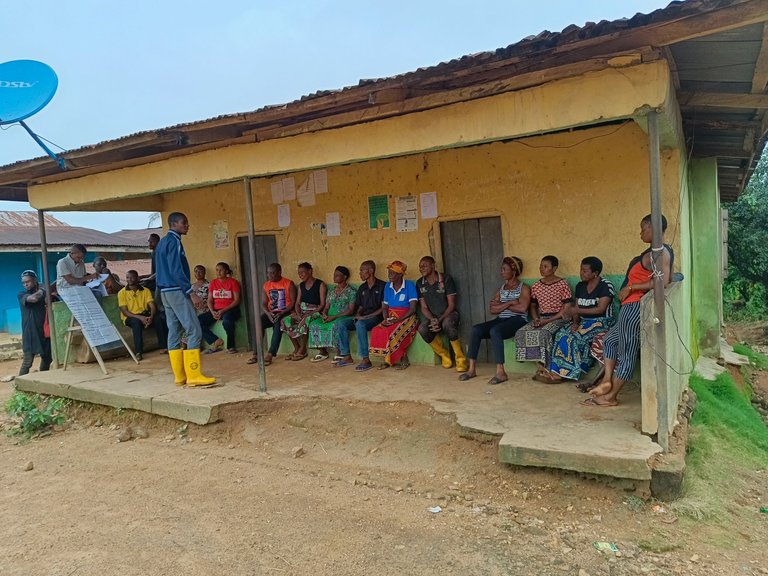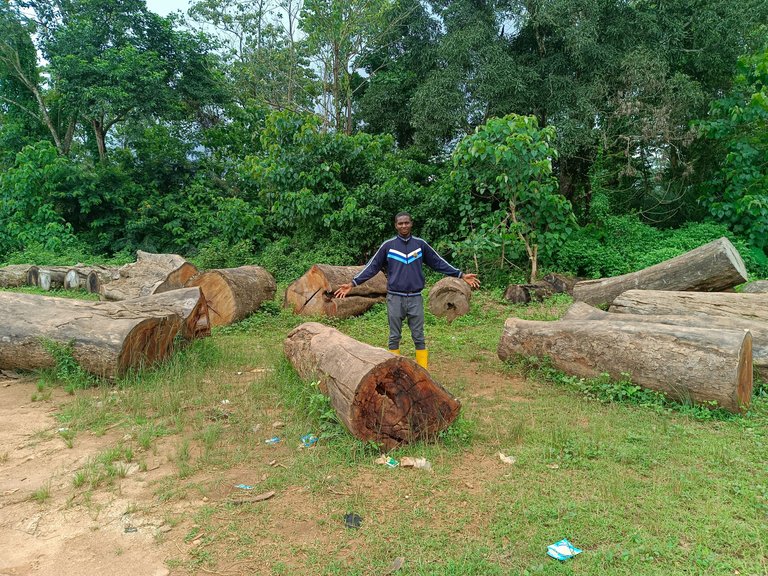Hello, dear advocates of healthy ecosystem and biodiversity conservation. I trust you've had a wonderful day. I recently conducted a training session with my farmers on the critical topic of Deforestation at one of my assigned locations. Prior to delivering my lectures, I posed an open question about the rampant tree cutting observed within their community. A number of them shared that they resort to this practice as a means of generating swift income to alleviate poverty. Additionally, some mentioned that they engage in tree cutting to construct bridges, facilitating the passage of heavy water flow to their farms. Upon hearing their perspectives, I gained insight into the reasons behind these actions. I then proceeded to enlighten them about the adverse consequences of deforestation and ways to responsibly manage this practice within their farms. It has become evident to me that the primary driving force behind the unregulated felling of forest trees is the pursuit of income generation. To begin, allow me to provide an introduction to the concept of deforestation.


Introduction:
Deforestation is the widespread removal of trees from forests and woodlands. It has emerged as a significant environmental concern, triggering adverse effects on biodiversity, climate change, and local ecosystems. While it's undeniable that deforestation provides a quick source of income for some, its long-term consequences are undeniable and demand a shift towards responsible management practices. In this article, i explore a convincing approach for farmers to manage deforestation while meeting their needs for furniture and bridge construction.
The Quick Income Temptation:
Deforestation often lures farmers with the promise of swift monetary gains. The sale of valuable timber for furniture and bridge construction can seem like a lucrative endeavor, especially in the short term. However, this immediate financial benefit comes at a high price, irreversible damage to the environment and the loss of countless ecosystem services that forests provide.
Embracing Responsible Deforestation Management:
Farmers play a vital role in preserving our planet's health while securing their livelihoods. Instead of succumbing to the allure of quick income through reckless deforestation, I made them understand that they can adopt responsible practices that balance their economic needs with environmental stewardship.
Sustainable Logging Techniques:
Implementing sustainable logging methods, such as selective cutting and tree replanting, can mitigate the negative impacts of deforestation. By carefully choosing which trees to cut and leaving the rest untouched, farmers can allow the forest to regenerate naturally, preserving its ecological balance.Reforestation Initiatives:
For every tree felled, farmers can commit to planting several new ones. Reforestation efforts can help counteract the loss of tree cover and contribute to the restoration of local ecosystems. This proactive approach ensures a continuous supply of wood for furniture and construction without depleting the forest.Diversification of Income Sources:
Instead of relying solely on deforestation, they can explore alternative income streams that don't harm the environment. Agroforestry, eco-tourism, or producing non-timber forest products like fruits, nuts, and medicinal plants can generate revenue while safeguarding natural resources.Collaboration with Conservation Organizations:
Partnering with environmental groups and governmental agencies can provide the farmers with resources, knowledge, and financial incentives to transition towards sustainable practices. These partnerships can help them access markets for certified sustainable wood products and gain recognition for their conservation efforts.Long-Term Vision:
I made them understand that the consequences of deforestation are far-reaching and extend beyond their immediate gains. Encouraging a long-term perspective can help them realize the importance of preserving forests for future generations and the overall health of the planet.
Conclusion:
Deforestation for quick income is a short-sighted approach that jeopardizes the delicate balance of our ecosystems. Not only farmers but we all have a crucial role to play in mitigating this issue by adopting responsible deforestation management practices. By implementing sustainable logging, reforestation, diversifying income sources, collaborating with conservation organizations, and embracing a long-term vision, we all can not only secure our livelihoods but also contribute to a healthier and more sustainable future for all.
Thanks for reading as you continue to promote a healthy ecosystem and conserving biodiversity.